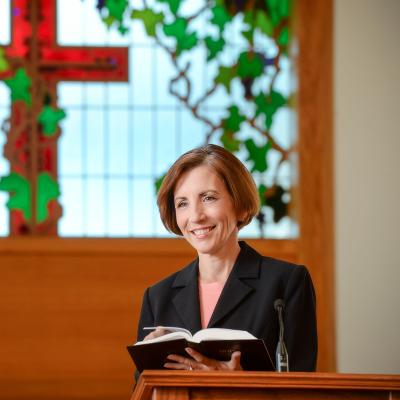- AdventHealth University

More than half of adults in the U.S. consider religion to be an important aspect of their lives. A Pew Research Center study reveals that 47% of adults deem religion to be ‘very important’ and 23% consider it to be ‘somewhat important.’
Individuals with religious affiliations often belong to communities that share their same beliefs and world views. They can look to religious leaders — such as chaplains and pastors — for spiritual guidance, moral support, and advice about life decisions.
Chaplains and pastors minister to individuals regularly by leading religious services or offering spiritual guidance. The core responsibilities of the two roles are similar. Each occupation also necessitates an educational background in spiritual studies, such as a master’s in divinity or spiritual care. However, when considering the career path of chaplain vs. pastor, there are some differences.
Defining the Roles of Chaplains and Pastors
Chaplains and pastors play a significant role in the lives of diverse groups of people. They are both theologically educated and certified ministers. However, their job descriptions vary in a few ways. An easy way to remember the difference is that while all chaplains are pastors, not all pastors are chaplains.
What Does a Chaplain Do?
A chaplain is a certified clergy member who provides spiritual care for individuals in a non-religious organization, rather than a church congregation. Chaplains can work in government roles and serve members of the military in different locations. They can serve patients in healthcare or hospice facilities. Working in police departments, fire departments, and prisons is also common for chaplains.
Since chaplains are ordained ministers, they can officiate ceremonies such as weddings and funerals. They can lead baptism services and provide final rites for patients who are passing away. Chaplains can also take on the role of a spiritual leader for individuals who do not belong to a specific religious community.
Rather than preaching messages directed toward one religious group, chaplains lead non-denominational religious services that can benefit individuals from a variety of religious or spiritual backgrounds. Chaplains who hold positions at different institutions can also minister to staff members. For example, chaplains at hospitals can provide spiritual care to nurses, doctors, and administrators, as well as to patients and their families.
What Does a Pastor Do?
The main difference between a chaplain and a pastor is that they serve people in different locations. A pastor is an ordained clergy member who works in one religious organization, such as a church or parish. Pastors serve their congregation consistently by planning and overseeing weekly church services. They typically lead worship services and preach sermons. Providing spiritual guidance for specific communities of believers, according to the beliefs of a certain denomination, is the most important duty of pastors.
Delegating responsibilities to staff members — to ensure the church can effectively function — is another essential aspect of a pastor’s job. Often, pastors hire worship leaders, youth pastors, administrators, and community outreach leaders to perform various tasks within a church. Volunteers can also take on certain roles during weekly services.
Sometimes, pastors can also serve in a chaplain-like role, administering to individuals at a local hospital, prison, or military base. However, rather than being a permanent board-certified chaplain for an organization, pastors usually volunteer a certain amount of their time each week or month.
A pastor can have a different title in different religious settings. For example, many Protestant Christians refer to their religious leaders as pastors, while Catholics refer to theirs as priests. Believers in non-Christian faiths or other religions also have different names for their spiritual leaders.
How to Become a Chaplain or Pastor
Even though spiritual leaders work in different types of organizations and have different responsibilities, the processes to become a chaplain or a pastor are relatively similar.
Education and Experience
Individuals who are looking to become chaplains or pastors should begin by earning a bachelor’s degree in theological studies, pastoral studies, biblical studies, or religious studies from an accredited institution. Most organizations and churches expect chaplains and pastors to also have an advanced degree in the field. Pastors often attend seminary and earn a Master of Divinity. Chaplains may also earn a Master of Divinity or a Master of Science in Spiritual Care to prepare them for roles outside traditional religious settings.
After gaining a strong educational foundation, prospective chaplains and pastors gain experience in the field through internships, residencies, or working under the supervision of a lead chaplain or pastor. Some seminaries offer this hands-on training as part of their master’s degree programs.
Ordination
To find employment in religious or non-religious organizations, pastors and chaplains should seek ordination. They typically go through an application process in which they provide essential documents and sit for interviews.
Pastors can become ordained through organizations such as the National Association of Christian Ministers. Specific churches may have different procedures and additional requirements. Chaplains can earn certification through accredited organizations such as the Board of Chaplaincy Certification Incorporated (BCCI) or the National Association of Catholic Chaplains (NACC).
Salary and Job Outlook
The salaries for full-time ministry positions can vary, based on the organization, job location, and position in the organization. However, the U.S. Bureau of Labor Statistics (BLS) notes the annual median salary for clergy members as $50,400. While the lowest 10% earn an average salary of $26,810, the highest 10% can earn an average of $86,970. The job outlook for clergy members is projected to grow by 6% between 2019 and 2029, which is slightly faster than the average rate for all careers.
Provide Spiritual Guidance as a Chaplain
Working in a spiritual leadership role is rewarding, and can be more encompassing in non-religious settings such as hospitals or hospice facilities.
The Master of Science in Spiritual Care degree at AdventHealth University Online is focused on spiritual care in healthcare settings. Its core curriculum includes courses such as Christian Ethics in Healthcare; Spirituality, Health, and Wholeness; Grief and Loss; and Living from a Pastoral Theology. Electives offer specialized areas of study such as Spiritual Care in Pediatrics, Spiritual Care and Mental Illness, and Spiritual Care in Crisis and Trauma.
Explore the university’s spiritual care program today, and learn how you can have a successful and meaningful career as a chaplain.
Recommended Readings
AdventHealth University’s Master of Science in Spiritual Care Gains Important Accreditation Affirmation
Sources:
BCCI, Board Certified Chaplains
Houston Chronicle, “Chaplain vs. Pastor”
Houston Chronicle, “What Is the Difference Between a Chaplain & a Pastor?”
NACC, Certification Prerequisites
National Association of Christian Ministers, Become an Ordained Minister
PEW Research Center, “The Global God Divide”
U.S. Bureau of Labor Statistics, Clergy


